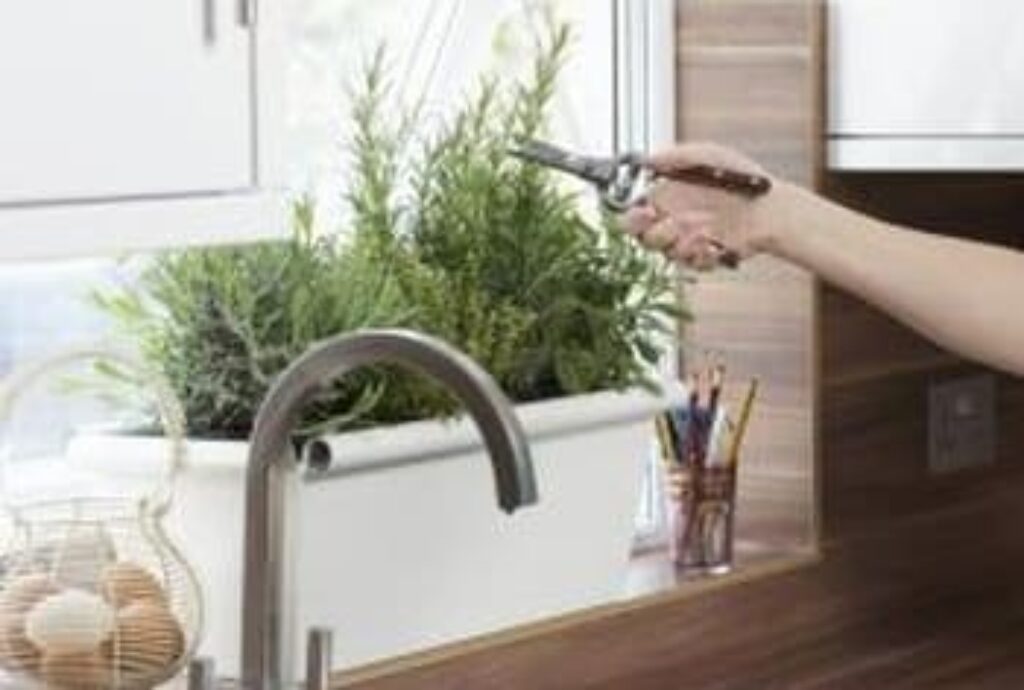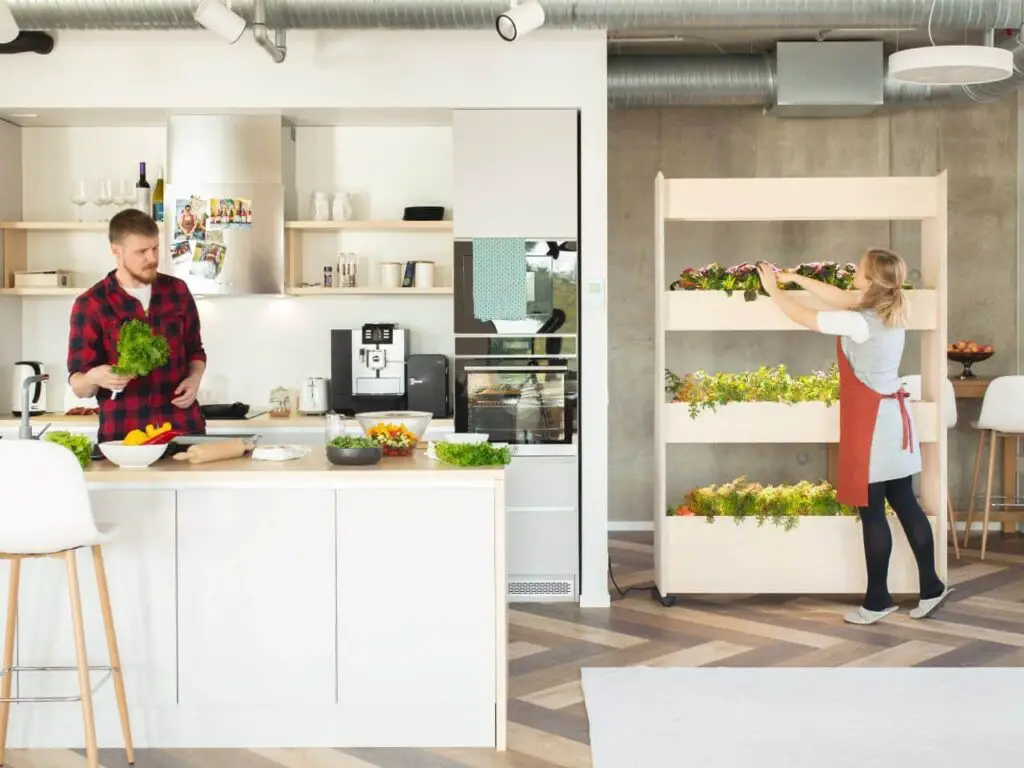Tips on Growing Herbs Indoors With Artificial Light
GardenerHeaven.com is reader-supported. When you buy through links on our site, we may earn an affiliate commission.
Fresh herbs are great. However, the only thing even better than fresh herbs is growing herbs indoors with artificial light! Growing herbs indoors is hassle-free, simple, and convenient yet inexpensive. And a big pro of growing herbs is that almost never do they get attacked by pests or insects. Also, the pleasant earthy fragrances from the herbs will surely keep your mood uplifted.
When you decide on growing herbs indoors with artificial light, you also need to know a few things to do it correctly. Some herbs need more light; some of them need less light. Then there are other requirements specific to the type of herb you would grow.
In this blog, we will give you some expert tips on growing herbs indoors with artificial light. Before you start your plantation, follow our guide to get the most amazing indoor herb garden! You can head to Click & Grow for some fantastic indoor herb-growing accessories!
Pick The Right Herbs for Growing Herbs Indoors With Artificial Light
Starting strong and well-prepared is key to any successful work completion. With good artificial lighting and a planting box, you can grow almost all types of herbs indoors. But there are a few varieties of herbs that are known to thrive better than others while planted indoors. For instance, Basil, mint, chives, oregano, marjoram, parsley, rosemary, Artemisia, thyme, etc., everyday herbs are especially easy to grow without creating a fuss inside your house. They require some basic taking care, and they are suitable to grow!
You can easily grow these herbs from their seeds through grafting or other planting procedures. However, using controlled plant pods from professionals is a better way to create a strong foundation for your indoor herb garden.
Take a Look at The Health of the Seedlings
Healthy seedlings equal to a healthy garden, and it is well-known, of course. If you are planning about growing herbs indoors with artificial light, do not ignore the health of the seedlings, whether you are growing them from seeds or buying a grown pod. Look for any brown spots or discoloration on the leaves and stems before purchasing a plant. And give close attention to the seedlings if you are growing them with seeds. Look for any wilting and dead leaves. Discard the seedlings immediately if you see any of these signs.
Find the Right Location to Grow the Herbs
Before you start growing herbs indoors with artificial light, you must know which place is perfect for them. Some herbs need at least 6 hours of light a day, while others may even need up to 12-16 hours! Of course, using artificial light is beneficial in these cases. You can expect the best results from using HID or LED lights. Also, be sure to check the temperature of your room you would keep your plants. Most perennials cannot necessarily withstand cold, windy, and low-temperature conditions. Check for their optimal temperature and keep your indoors accordingly. Even humidity may pose some threat, so be sure to cater to that, too.
Select the Right Container or Pot to Grow the Herbs
How your herbs will turn out hugely depends on the pot you will grow them. You will find numerous plant pots suitable for herbs if you are looking in the right place and in the right way. The most crucial factor while growing herbs indoors with artificial light is to select a pot or container with appropriate drainage facilities. Without proper drainage, you cannot expect the plant to grow perfectly. If you are looking for the right setting for your plants, you can choose the Smart Indoor Gardens from Click & Grow and see your indoor garden thrive!
Know What Light to Use
When it comes to growing herbs indoors, the most crucial factor is the lighting! Each herb has its own requirement for natural light, which is not usually available in our homes. That is why Artificial Lighting is a must for a healthy, luscious indoor herb garden.
When starting with the planting, research the herb you are using. For instance, Basil, mint, chives, etc., would usually require 10+ hours of light every day, while oregano could easily do with 8 hours of lighting.
We would recommend LED Grow Lights for your venture of growing herbs indoors with artificial light. However, you can look at Click & Grow for other expert gardener accessories and smart gardening systems!
- Keep the Temperature at 60-70 Degrees F.
- Provide Sunlight to the Herbs, Too!
- Opt for Slow and Thorough Watering Methods.
- Check the Drainage.
- Know the Enemies to Your Herbs!
- Use Separate Pots for Separate Herbs.
- Choose a Good Quality Soil Mix for Indoor Gardening.
- Harvest Appropriately
- Use Fertilizers for The Herbs
- Ensure Good Airflow Around the Plants.
Keep the Temperature at 60-70 Degrees F.
Herbs are not much of a hassle to grow at your home. However, you need to keep the temperature under control for them to grow healthy. The most optimal condition is at 60 to 70 degrees. Basil usually loves warmth and enjoys a good 75 degrees at times. At the same time, all others are mostly cozy at 65 degrees.
Provide Sunlight to the Herbs, Too!
Artificial lighting is undoubtedly great but showing them to the sun every now and then does not hurt, does it? Even the herb pots are not usually very bulky and heavy. Thus, they can be moved from place to place easily. If you show your herbs some sun on a sunny day, they will bloom even better. Just leaving them in front of the window would suffice!
Opt for Slow and Thorough Watering Methods.
Letting the soil breathe in between the watering process is crucial for the overall growth of herbs. You need to be steady yet slow with the watering process. You cannot overwater and under watering is, of course, a big no. Use the 2-inch techniques to determine whether you need to water the plan or not. If the soil is dry under 2-inch-deep the earth, you can water the plants now with a gentle sprinkler. Or, a self-watering tray is also handy if you do not have enough time to spare for watering. But you will be surprised to know that 3-4 days of watering should last your herbs a week or even more!
Check the Drainage.
Clogged water is not suitable for any plants, especially not good for soft, succulent herbs. While growing herbs indoors with artificial light, you need to be extra cautious about the drainage. That is why the first step is to buy a great plant pot with an excellent drainage facility. Our suggestion is to opt for any of the Indoor Garden Sets that cater to your needs perfectly!
Know the Enemies to Your Herbs!
It is wonderful that herbs naturally are less-prone to insects and pests. Is it not good news that you do not have to loiter around for ways to prevent an infestation in your indoor garden? Absolutely! However, while growing herbs indoors with artificial lighting, you need to consider a few small insects from time to time that can cause havoc. For example, Basil may invite the Japanese Beetles who love to munch on its young leaves. Likewise, there are very few such insects. So, it should be easy for you to control if you identify infestation in its early stage.
When you see infested leaves, cut them off. Then, look for the insect in between other leaves and stems. However, Ladybugs are not harmful to your plants, so they should be fine!
Use Separate Pots for Separate Herbs.
Another thing that many homeowners do is harvest different types of herbs into the same pot or planting tray, which is not the right way at all! Even many of my friends had this same type of prennials in their kitchen. I mean, it is fine if you plant different herbs in the same land outdoors. But inside the house, it is better to use a separate pot. And if you have any problem with space, opting for Smart Indoor Gardens is a great option!
The main reason why you should not do this is that not every she has the same irrigation requirement. You need to understand what your plant needs, and the best option is through separate planting space or pots.
Choose a Good Quality Soil Mix for Indoor Gardening.
The plants do not get the same amount of nutrition from indoor gardening as they would outdoors. The same is the case when growing herbs indoors with artificial light. Use specialized potting mixes that are not much dense and compact. These mixes will be suitable for almost any type of herb you want to grow in your home.
Harvest Appropriately
Keeping the herbs trimmed and tidy is a must, especially for your home. Cutting and collecting the leaves, pruning them should be your weekly tasks. But pruning needs to be done carefully and properly.
While harvesting and trimming, leave the luscious, big green leaves near the root intact. These leaves hold in the light energy needed for photosynthesis. Also, these leaves will help in keeping the roots healthy and pests away.

Use Fertilizers for The Herbs
Herbs do grow with fewer efforts given to them. However, showing some affection towards them should not lack in any way. Using fertilizer to the soil will help them grow fuller and be more lively.
We recommend using fertilizers with seaweed or fish bases. Fertilizing the pots once a week during summer can give you satisfactory results with watering them twice.
Ensure Good Airflow Around the Plants.
When you plant too many herbs in a small place, you will find less yield. So, try and keep space among the pots, or you can use an Indoor Garden if you want better airflow and a tidy indoors.
Many famous and everyday use herbs can be grown indoors. Some of them are Basil, Cilantro, Oregano, Parsley, Rosemary, Thyme, Tarragon, Bay, Mint, etc.
Growing herbs indoors does not take much an effort from you. You need healthy seeds or plants, a good quality planting pot, good quality soil, and an LED grow light. Also, you can opt for accessories from Click & Grow and accelerate your herb garden.
Herbs do not take much taking care of. However, you need to water your plants at least twice or thrice a week. You need to be gentle while watering them as they are delicate. Also, you can check two-inches deep into the soil to see if the bed is wet or not. If the soil is dry, you should water the pot then.
It is recommended to give at least 6 to 8 hours of direct sunlight to the plants. You can keep the plants in a sunny place, or artificial grow lights should do the trick. Even if you use grow-lights, placing it near the window should give better results!
Mint, sage, thyme, lavender, chives, etc., do not need to be replanted every year. They remain in right conditions all year round.
Some annual cannot withstand the cold and thus needs to be replanted every year—for example, Basil, cilantro.
The Mediterranean herbs like Rosemary, Tarragon, Sage, etc., are comparatively harder to grow indoors.
A pot with good drainage and soil quality should be enough for any herb to grow, especially with artificial light. So, they do not necessarily need direct sunlight. However, putting them under the sun near your windows will surely help in its growth.



